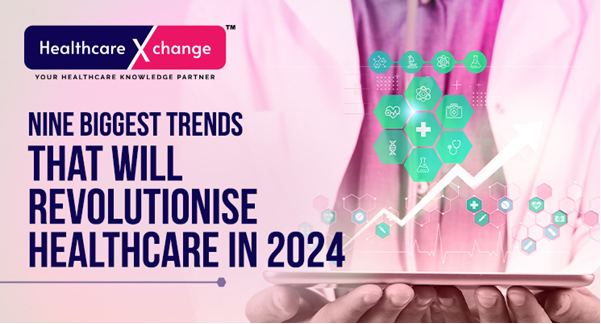
Nine Biggest Trends that will Revolutionise Healthcare in 2024
- Healthcare and General Service
- October 14, 2024
Highlights
-
A convergence of important developments will result in a profound upheaval in the healthcare business by 2024
-
Amalgamation of AI-powered data, digital solutions, and cutting-edge healthcare gadgets has shown what the future holds for the healthcare business
Nine significant medical issues are expected to reshape the market by 2024. These include artificial intelligence (AI), political reforms, medical advancements, retail behemoths, and other factors.
Retailers attempt to crack healthcare, with varied results:
In 2024, retail giants are expected to intensify their healthcare efforts, focusing on complex care like chronic diseases. Newcomers like Costco plus existing players like Amazon, Best Buy, and CVS Health have entered the market, despite setbacks. While the future of healthcare remains uncertain, the rise of consumer-oriented care is expected to disrupt traditional care pathways, presenting opportunities for collaboration between retail giants and traditional providers, as well as care delivery startups.
A new wave of weight-loss medications will transform obesity treatment:
The obesity drug market has experienced a boom due to the success of GLP-1 receptor agonists, originally developed to treat diabetes. Analysts predict global obesity sales could reach USD 77 billion in 2030 due to rise in obesity rates, unmet medical needs, plus growth in pharma and venture capital investment. Established players pursue label expansions together with vying for breakthroughs in oral formulations, minimum side effects, and longer-lasting drugs. The ripple effects of GLP-1s may extend across medical devices as well as food industries.
Clinical experiments involve digital twins:
Digital twins, virtual representations of people, tissues, plus organs, are being used in clinical studies to predict treatment outcomes, speed up enrollment, and expedite drug development. Companies like Unlearn as well as Merck KGaA are collaborating to incorporate digital twins into late-stage studies.
The hospital M&A market will heat up alongside regulatory monitoring:
Hospital mergers and acquisitions are expected to continue in the coming year, despite increase in regulatory pressure. Several cross-market mergers have closed, with more on the horizon. States with favorable COPA laws could facilitate larger mergers, while distressed hospitals may spark smaller deals. Although M&A activity is expected to escalate, transactions will likely be approached with greater caution and deliberation. Strategic objectives like capability gaps along with care diversification will drive mergers & acquisition (M&A) activity.
Transparency in drug prices:
In 2024, price transparency will be a significant focus due to regulatory pressures plus competition from low-priced drug companies like Mark Cuban’s Cost Plus Drugs. Blue Shield of California shifted its pharmacy benefits to Amazon and Cuban’s drug company, while CVS Health revamped its pricing model, aiming for greater clarity. As health plans, employers together with consumers continue to push for transparency, pharmacy giants may follow suit.
Food as Medicine:
In 2024, food as medicine may become a focus, with evidence showing medically tailored meals, groceries, and produce subscriptions can lower chronic disease risk. CMS has approved Medicaid coverage for nutrition interventions in Massachusetts, Oregon, Arkansas, North Carolina, and New Jersey, and more states may follow suit. Health systems and insurers are integrating nutrition programs to manage diet-related diseases, with more players aiming to reduce costs.
Health equality has become a strategic focus:
Health equity has become a regulatory reality, prompting healthcare organisations to prioritise it. The CMS has implemented guidelines mandating hospitals to collect race plus ethnicity information, and the FDA will require diversity plans for late-stage clinical trials. These catalysts aim to make 2024 a year of significant strides towards a more equitable healthcare system.
The Psychedelic Revolution is Coming:
Psychedelics are expected to gain increased attention in the US treatment stage, with MDMA on the cusp of FDA approval and psilocybin therapy in Oregon. Over 50 US public companies are developing psychedelic-like drugs for various mental health disorders, including depression, anxiety, stroke, Alzheimer’s, and traumatic brain injury. While 2024 may not be the year psychedelics become the new Prozac, there is a growing desire to challenge the status quo.
The Promise and Potential of AI:
In 2024, AI-focused healthcare will transition from research labs to real-world clinics, delivering tangible solutions like virtual scribes and AI-enabled medical devices. Physician groups like Permanente Medical Group are already adopting these tools to ease documentation burdens. However, the success of these technologies will depend on clear frameworks, responsible development, and affordability.




